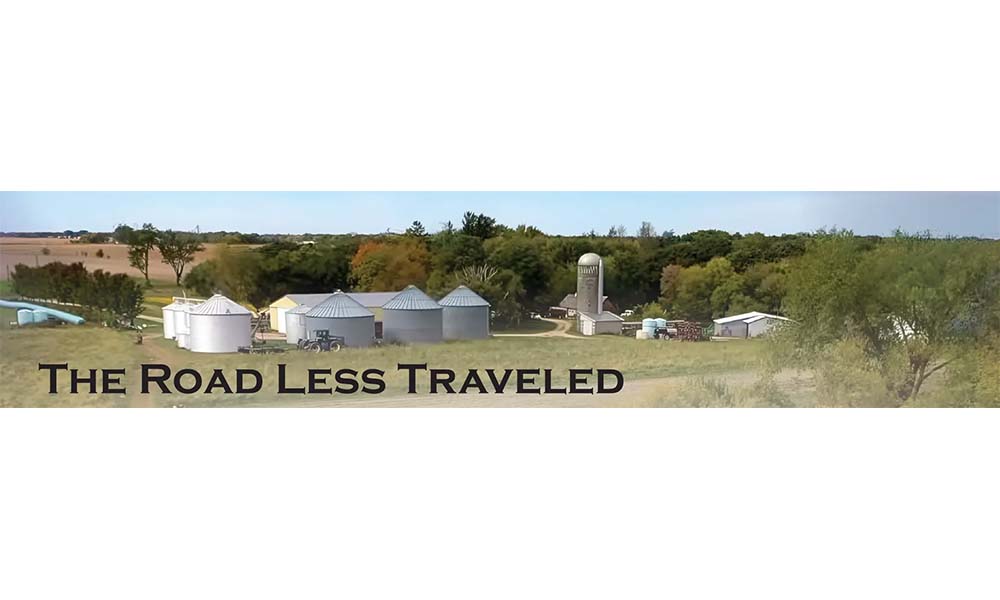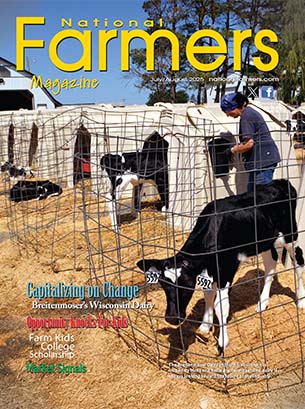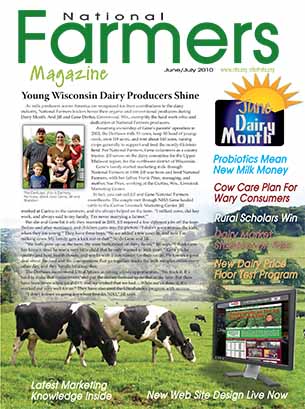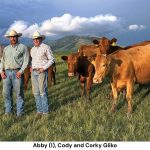Like many early small communities, Good Thunder, Minnesota, just outside Mankato, has its roots in agriculture.
Named for a local Dakota chief, this town on the Maple River was a bustling center of commerce in the late 1880s.
With an influx of settlers, the town boasted multiple churches, grain elevators, flour mills and hardware
millinery stores. Other businesses took root in the growing town including brickyards, blacksmith shops,
a creamery, a restaurant, shoe store, jewelry and book stores. Two general stores, banks, a tailor, saloons,
telegraph receivers, and a newspaper came in the early 1890s.
One of the families that moved into the area came from Iowa. The Phillips, Theodore and Mary, trekked north in
1930, slowly moving all their equipment, cattle, horses and family during that year. On the same modest acres his grandfather farmed, Martin Phillips is raising a variety of organic crops on Blue Skye Farms and serving his community.
“My father was a baby when my grandparents settled here,” Phillips recalled. “When the war ended and my dad returned and married, his new bride joined the farm. She was fine with crops and livestock, but Dad couldn’t convince her to milk, so the dairy cows left.”
Transitioning more towards farming, his father saw many changes in the agriculture industry. Advanced
equipment, fertilizers, herbicides and pesticides were advertised as the solution to all the farmer’s problems.
“As the years have passed, we have learned that all the chemicals have had negative impacts,” Phillips
noted. “Soil health and water quality has declined and there are countless human diseases and cancers
attributed to all those chemicals.”
Having health complications himself and within his family, Phillips took a hard look at the advantages
and disadvantages of traditional agriculture. While production can be high, so are inputs, and you still
have unpredictable markets, he noted. “With conventional agriculture, you try to sell products in the upper
third of the market, but you never know when that is.”
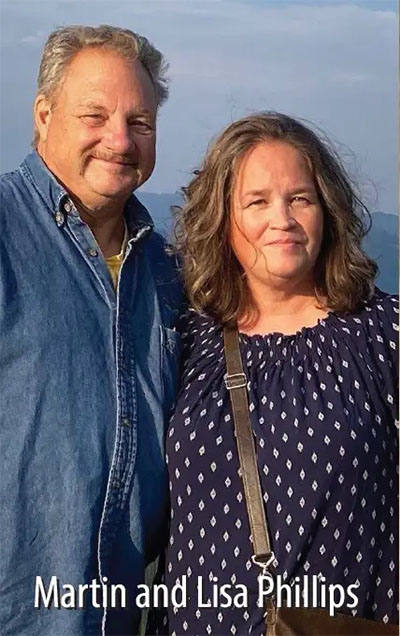
The Road Less Traveled
Not wanting to be constantly looking for more land to rent and concerned about the environmental impact
of chemicals and traditional farming methods, Phillips began exploring organics.
Moving down a different road to organics, he measures success not in the size of his operation or even
his profits but in his ability to feel good about his contributions to soil health, the environment, and his
community.
The organic market provided Phillips with opportunities he didn’t find with conventional crops. Not following the bigger is better crowd, he is more concerned with profitability on his modest farm. “We are certified to grow 57 organic crops on our 420 acres.” Not afraid to try something different and explore a new crop gives him flexibility regarding what he plants in a given year. If a particular crop market looks like it has potential, Phillips will give it a go.
Having planted organic peas and millet, along with corn, soybeans, wheat and oats, he knows that sometimes it works out and other times it doesn’t. But he doesn’t let that get in the way, “Each day is a new opportunity.”
Using what is happening with the weather, previous experience and research, Phillips has an idea what
small grain or hay crop might work. He then relies on market advice from National Farmers NForganics
marketer Mike Shulist to decide what to plant. “Mike has the expertise, time, connections and resources
that enable him to keep abreast of the organic market. I have tried, but he does a way better job than I can,”
Phillips said.
In 2023, Phillips raised organic wheat. With a miller a few miles away in a nearby town, he thought that
he had the perfect market at his fingertips. But that didn’t work out. However, Shulist found other opportunities
further afield. Phillips ended up going through a broker in New York and shipping the wheat to
North Dakota. “Mike does all he can do every time for us, we can’t ask for more than that.”
“Mike is honest and stays in touch. Collective marketing works, we were able to get .59 cents more a
bushel for our soybeans last year. But some years that isn’t the case and Mike lets us know either way.”
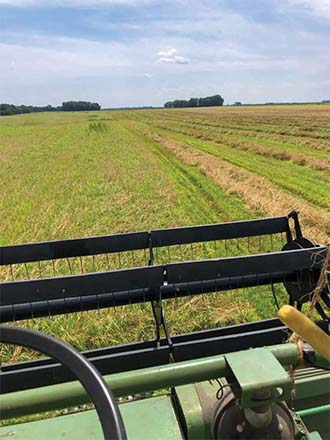
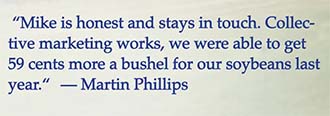
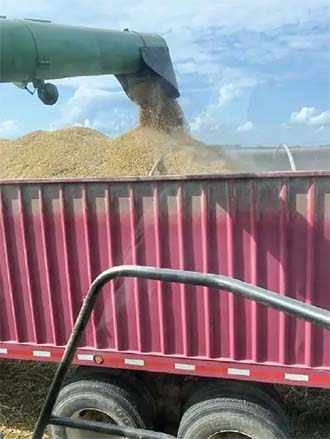
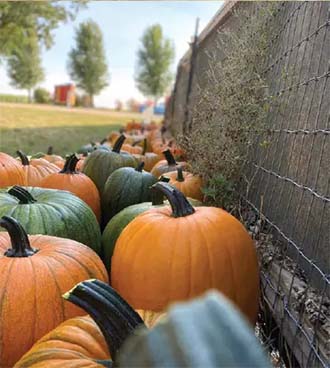
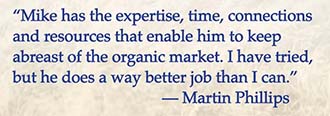
Growing More Than Crops
In addition to small grains, Phillips and his wife, Lisa, raise organic pumpkins and vegetables. The
particular vegetables planted in their large garden vary each year. The unpredictable spring weather and
the amount of rain that falls in early summer often dictate what gets planted. “Sweet corn didn’t get in the
ground this year because we had a year’s worth of rain during June,” he commented.
Typically, they grow potatoes, beans, peas, peppers, radishes, beets along with other things that sound
appealing come planting time. The Phillips’ have also tried strawberries but found them too labor intensive.
However, apples and blueberries are on the list to try. “We tried a farm stand but that was a huge time
investment.”
Currently, any produce they don’t use for their own family is donated to the local food pantry. Wanting to
support their community and share their blessings, he said, “We realize how fortunate we are to have a
large garden and grow fresh foods.” What produce isn’t suitable for consumption gets composted and
used in the garden for fertilizer.
For the last nine years, the Phillips have spent weekends in September and October hosting families and
busloads of kids who come to enjoy the farm and overflowing pumpkin patch. Giving folks the opportunity
to enjoy a day in the country filled with family fun is why the Phillips plants five acres of 18 varieties of
pumpkins each year.
Orange, yellow, white and even blue pumpkins in every shape and size are available for families to kick off the season. “Pumpkin Junction, our pumpkin patch, hay rides, games, activities, and sunflower field are a labor of love,” he said. “Hand-feeding our goats is always a highlight for everyone, regardless of age.” Lasting memories are made and family traditions are forged as local families return year after year. Growing more than crops on their farm, the Phillips’ are growing community.
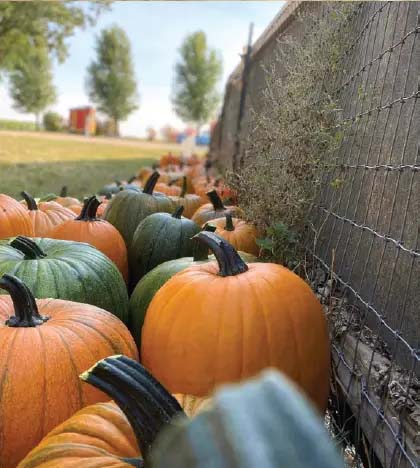
Raising Organics Isn’t For Everyone
Raising organics isn’t for everyone, Phillips acknowledged, but for him, going organic is more about a philosophical commitment than it is about economics or profit potential.
Transitioning to organic production can be a long road and takes dedication, he said. For those thinking about going organic, he suggested starting small. “Start with 40 or 60 acres and try it,” he recommended. “See if it works out.” While weeds can be troublesome, Phillips has seen an increase in soil health on his farm.
“The soil is alive with those things I can see, like earthworms. I can only imagine how active the life is that I can’t see.”
Growing organic crops isn’t easy, but serving his community has made it worthwhile. And partnering
with National Farmers and Mike has made this road less traveled easier.

